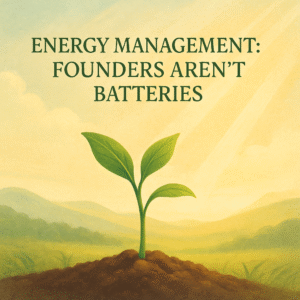
Some days, you wake up ready to take on the world. Other days, even the smallest task feels like a grind. That’s not a character flaw — that’s energy mismanagement. And too many founders treat themselves like batteries that can be drained and recharged at will.
But you’re not a battery. You’re a human being — dynamic, rhythmic, complex.
And in a time where every inbox is overflowing, capital feels tight, and trade winds (and trade wars) keep shifting, most founders I work with don’t have a time management problem — they have an energy one.
What’s Draining You?
Start there. What’s currently draining your energy?
Not just the 12 Zoom calls or the late-night pitch deck rewrites. Go deeper. What’s emotionally exhausting? Where are you saying yes to things you no longer believe in? What conversations or people leave you feeling hollow?
Energy drains aren’t always loud. Sometimes they hide in old commitments you forgot to renegotiate, in roles you’ve outgrown but keep performing out of habit, or in relationships that require you to be someone you’re not.
Identifying those drains isn’t just good self-care — it’s strategy. You can’t scale exhaustion.
What Charges You?
The flip side: Where do you feel lit up?
When I work with founders, I often ask them to map their energy: physical, emotional, mental, and spiritual. We rate each on a scale of 1–10 and then explore what’s fueling or depleting them. The results are always revealing.
Most founders are running on borrowed energy. But the high performers? They build habits and boundaries that regenerate them. A walk with their partner. Reading something that sparks new thinking. Getting 90 minutes to just think.
You don’t need a sabbatical. You need a sacred hour.
Build Boundaries That Hold
It’s one thing to know what energizes or drains you. It’s another to build a system that honors it. That’s where boundaries come in.
Not rigid walls. But resilient filters.
High-performance founders design their schedules and systems around what matters most. They learn to say no with clarity, not guilt. They stop rescuing people who haven’t asked for help. They realize that protecting their energy isn’t selfish — it’s a sign of leadership.
And they revisit those boundaries often, because growth requires recalibration.
Energy Isn’t Unlimited — But It Is Renewable
Here’s the truth: your energy is your most precious resource. It’s what allows you to show up as the version of yourself your team, your business, and your family need.
But it requires stewardship. And that means asking hard questions like:
- What’s mine to carry right now — and what isn’t?
- What old stories or roles do I need to retire?
- What’s one small shift I can make this week to protect or restore my energy?
Because transformation doesn’t happen in massive leaps, it happens in micro-moves made consistently — the kind that compound. And energy management is the soil in which those micro-moves take root.
Let’s make real progress doing meaningful work — with your energy intact.
If you’re ready to reclaim your energy and redesign your operating system, I work with a select number of founders each quarter.

